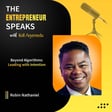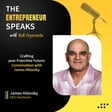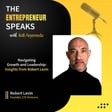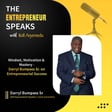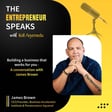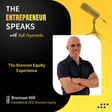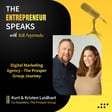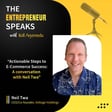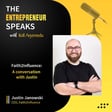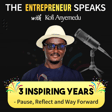Become a Creator today!Start creating today - Share your story with the world!
Start for free
00:00:00
00:00:01

Leadership and Organizational Development - The HAICAD Journey
" Leadership is Cause , everthing else is Effect"- John C. Maxwell
In this episode of The Entrepreneur Speaks Podcast, Daniel Kwame Pobee, a certified John C. Maxwell Coach , Speaker and Trainer shares his wealth of experience in leadership as well as highlights the essential aspects of his journey in building HAICAD, a human and organizational development firm.
Enjoy this insightful conversation.
Don't forget to like and subscribe .
#theentrepreneurspeakspodcast
Transcript
Introduction to Leadership Insights
00:00:06
Speaker
So for my journey, one key person that has influenced my journey so far as leadership, training and coaching is concerned is Dr. John C. Maxwell.
00:00:21
Speaker
And there's a statement that is attributed to him. He says that leadership is cause. Everything else is effect. Leadership is cause. Everything else is effect. Put it another way, he says, everything rises and falls on leadership.
00:00:43
Speaker
Everything rises and falls on leadership.
Meet Daniel Kami Pobi
00:00:46
Speaker
Welcome to another exciting episode of the Entrepreneur Speaks podcast, where our guests share their world of experience with you, our cherished listeners. I'm joined by a young man who's a firm believer in personal development, leadership and coaching.
00:01:04
Speaker
He's a leadership coach and an organizational development consultant with over 10 years experience helping individuals and organizations.
Daniel's Background & Education
00:01:14
Speaker
He's also a certified John C. Maxwell coach, speaker, and trainer. My guest is the founder and managing director of HiCAD Limited, a human and organizational development institution. Daniel Kami Pobi is my guest today. Sit back, relax,
00:01:34
Speaker
and enjoy our conversation. Welcome to my show, Daniel. Thank you very much, Kofi, and thanks for having me on your show. And I greet all your listeners. Thank you, Daniel. So let's kick off our conversation by you telling us a bit more about yourself and your childhood.
00:01:52
Speaker
Yeah, thank you very much for the question. So as you mentioned, my name is Daniel and I was born in Ghana, specifically in the Upper East region of Ghana, the Bogatanga.
00:02:08
Speaker
That is the place. That is the name of the place. That's where I was born. That's where I grew up. I had my primary, secondary and post-secondary education all from the Upper East region of Ghana before
00:02:27
Speaker
I entered into the university. It's when I came into the university that I shifted location a bit. But that is really where I grew up, up until post-secondary. I say post-secondary because I did teacher training.
00:02:45
Speaker
At that time, it was teacher training college. Now it's College of Education and now they offer diploma. At that time, we were doing Set A, certificate A. So we'll call ourselves a Set A teacher. So that's basically my background. I have a family. My mother tried. She gave birth to eight children.
00:03:12
Speaker
And I happen to be the seventh born.
Founding HiCAD Limited
00:03:16
Speaker
So the last one just comes after me. And then I also have siblings, four other siblings for my father's side. So for my father's side, I'll say that I'm the second of the children. And then so in all, I have more than 10 siblings if I put for my mother's side and my father's side together.
00:03:41
Speaker
And we grew up in the Upper East at Bogatanga. That is where we, most of us, almost all of us were born there. Just about, let me say, one of us from my father's side was born in Accra. But the rest of us, basically, were born at Bogatanga. And that is where I grew up. Thank you very much. Thank you very much. And listeners, I met Daniel.
00:04:09
Speaker
at the Premier University, University of Ghana. So our paths cross at the Premier University, University of Ghana. Thank you so much, Daniel. So Daniel, you are the founder and MD of HiCard. What's the story behind the setup of your fame? Okay, so thank you for the question. I will start from HiCard and where that name came from. Sure, sure. Please go ahead. And so it's an acronym.
00:04:36
Speaker
HighCAD is an acronym that stands for Human and Institutional Capacity Development. That is what HighCAD stands for. So HighCAD Limited. In other words, Human and Institutional Capacity Development Limited.
Transition to Leadership Training
00:04:56
Speaker
That is what the name stands for.
00:04:59
Speaker
The general haircut, I happen to have been working with the GIZ, the German International Corporation. That is the German Government International Development. And so I worked with GIZ for some time. And honestly, that is where I got more exposed to development work. Now, before
00:05:25
Speaker
I got into development work as a student at the University of Ghana, where we met, as you said earlier.
00:05:34
Speaker
It got to a time when I just wanted to do a part-time job, you know, to support myself. Eventually, I was led to one of the professors at the University, Professor Raymond Atuguba. And he picked me on as a research assistant. And one research work that we did was actually about the task culture of Ghana.
00:05:58
Speaker
tax culture of Ghana. How do Ghanaians see tax and how do they relate with tax? What is our attitude towards tax? Now, this was a research that was commissioned by the GIZ at the time it was GTZ. So when they commissioned that work as his research assistant, I was part of a team that worked on that together.
Challenges & Growth of HiCAD
00:06:23
Speaker
And it's during the work that the GIZ expressed interest in working with me if I was interested. And this was our final year.
00:06:35
Speaker
just before we finished school. And so I said, well, I'm interested, because they spoke to my boss, Professor Atugba then, and he spoke to me. I said, well, I'm interested. And then I started with GIZ before national service. And then I continued my national service there. And it was when I was at GIZ that I got more exposed, because Professor Atugba's work is more development oriented.
00:07:02
Speaker
We had done some work on the police and the apothecary and how they affected development and all that. Now, this tax culture got me into GIS and then I got more into the development work. I got more interested in developing institutions, organizations and people. And so my shadow
00:07:28
Speaker
more related to building capacity of our partner institutions, so technical support in that direction. So as I did that, then I got interested in development work, development studies,
00:07:45
Speaker
and all those things, so that I could help people. So you see, that is where the name came from. So it's basically about capacity development, but capacity development, looking at the individual and also looking at institutions or organizations. That is why we have human and institutional capacity development, HICART. So it's a limited liability company that is registered in Ghana.
00:08:14
Speaker
since 2014. We incorporated in 2014. So if you ask, that is how HiCAD started and we've been running for some time now. Wonderful. Thank you so much for this. So ladies and gentlemen, I present to you once again, the founder and MD of HiCAD Limited. And he's given us the story behind the setup
00:08:42
Speaker
of High Cut Limited. So from your submission, you started this in 2014. How has this journey really been? The journey has been tough and interesting. So, you know, starting business in Ghana on your own, it's not
00:09:06
Speaker
that easy to do that and especially when you are doing consulting it's not an easy terrain. Taking cognizance of the fact that I didn't work with a consultancy firm before starting and so just working with GIS that I stepped out there and then whereas for me I didn't go into taxation
00:09:28
Speaker
My consultancy firm is not into taxation. It is into leadership and developing leaders and organizations. So taking off was really tough. It was difficult. But it's been interesting, interesting because now this is one of the things that gives me performance as an individual, as a person when I'm able to add value to people.
00:09:57
Speaker
It satisfies me. So it's not really what you end. That gives me the satisfaction. But when I see people grow.
00:10:07
Speaker
When I see people improve, when I see people become better versions of themselves, not comparing themselves with any other, but themselves improving, it gives me so much satisfaction. And so it's been an interesting journey. But of course, to set up a company and to just do the training, there are two different things all together.
Defining Leadership
00:10:33
Speaker
And I can assure you that even up until now, I'm still learning.
00:10:37
Speaker
I'm still learning and i've learnt something on your platform when people have come on and they've talked about the use of social media and people have come on and they've talked about how they started your business and how they got clients on board and how they expanded all these are things that if you are running a company you learn along the way so you can also improve on the things that that you do so i'll use two keywords is being.
00:11:07
Speaker
challenging and interesting at the same time, starting High Card as a company. Thank you. Thank you very much, Daniel. So ladies and gentlemen, he's still learning. Learning actually never ends. And he's always satisfied. He's fulfilled when he sees people better, when he sees their lives of people better. So Daniel, you've talked about the fulfillment
00:11:38
Speaker
the utility you derive from your work. What indeed are some of the challenges you've encountered so far in running this entity? Can you share some of these challenges with us? So the challenge started with funding, funding for starting a business. Now, this is a business that is not so capital intensive.
00:12:06
Speaker
But unfortunately for me, I had engaged in other business on the side, not full-time, part-time, as I was with GIZ.
00:12:18
Speaker
that didn't go so well and it affected my finances. So when I was taking off with iCAD, I really did not have the little funding that was needed to start. And I had to come around looking for support here and there to get it established. And one funny thing is even having a laptop
00:12:43
Speaker
was not available as a consultant. I didn't even have a laptop when I started and in those days I'll be moving from one internet cafeteria to another if I needed to put together any training package for any organization or
00:13:02
Speaker
people. I have to move from one internet cafeteria to another just putting together my presentations and saving them via email so that I can access it anywhere else I go and then I put them on pen drive and then when I'm going to do that presentation or training I'll ask someone's laptop to go and do that. So I took off
00:13:28
Speaker
without the requisite funding, but that did not deter me. As I said, I had to do what I had and I could use the internet cafes to do that. So those places became my office. So depending on proximity, I'll go to one or the other. So funding
00:13:48
Speaker
was an issue and I think it is still an issue for a lot of people starting business. I advise people, I coach people and I tell them that just like it happened in my case, I didn't have the funding but that did not deter me. Another challenge is
Influences & Key Learnings
00:14:07
Speaker
the network, in consulting work, network
00:14:14
Speaker
plays a critical role. And so usually people start off and they've already built some network that they can leverage on. But as I said earlier, I did not venture into the area where I was working. So I was starting off into a different area altogether. I was moving into leadership
00:14:41
Speaker
and capacity development. When I was working at a place that was into taxation, specifically dealing with institutions that were doing taxation. So that was one challenge. I didn't have the network. I didn't have the, if you like, the pedigree or the name as a leadership
00:15:10
Speaker
expert.
00:15:12
Speaker
And so what did I do? So far as this challenge is concerned, I think I'm adding one question to your question. What did I do with this? I had to now pick on getting training and getting certification to add to some credibility to what I was doing. And that is what led me to get there. Don't see Maxwell International certification. It's now International Maxwell certification. So
00:15:42
Speaker
I had to go through that. I had to join an association of coaches in Ghana all to help build and mold me and to put me out there as someone that can be relied on when it comes to leadership training and coaching as well. So that was one major challenge apart from the funding, the network. The third challenge major one that I faced was the fact that I didn't have
00:16:10
Speaker
that credibility when I started. But of course, I built it along the way and I've been building it up until now. I don't think I'm where I want to get to. I'm still working at it. But these are the challenges. The fourth one I will say is the people to work with.
00:16:30
Speaker
You don't have the funding. You don't have what it takes to pay people. And even when you have money to pay people, you don't have the enough money to pay the caliber of people that you want to have to work with. I'm talking staffing.
00:16:47
Speaker
And so that was another challenge. And by the grace of God, I had people who were willing. Interestingly, some people just give you a call and tell you if there is anything that you need me to do, if there is anything that you want me to help with, I'm willing.
00:17:07
Speaker
So just as there's been challenges and you've given us a number of challenges you've encountered on this journey, I also believe that you've picked a lot of lessons. Can you please share some of these lessons with us? Yeah, you know, it's a journey. This whole process has been a journey and a learning curve for me.
00:17:29
Speaker
As someone who has studied business management, got an MBA in finance, you get the opportunity to apply
00:17:44
Speaker
what you studied and to see how to grow a business.
Traits of Effective Leaders
00:17:50
Speaker
Now that is the first thing that is satisfying for me because I now get an opportunity to say that this is a business that I started on my own and this is a business that I'm nurturing. I have learnt that no matter how good you are, you cannot do it alone.
00:18:12
Speaker
You cannot do it alone. It is attributed to the Chinese that say that if you want to go fast, you walk alone. If you want to go far, you walk together. And so a business as a going concern is supposed to go far. And so I have learnt that
00:18:34
Speaker
getting people on board, no matter how much the cost may be. And sometimes you can even get it cheaper if you appreciate that you need people and you look out there for them. And so I've learned the need to get people around you because alone there's this only little that you can do. You can do very little. So that is one of the lessons that I have picked. And I shared earlier that
00:19:02
Speaker
You don't, number two, you don't need all the resources to start. In my case, all I had was a desire, a passion to help people because working where I was, GIZ, I was exposed to a lot of capacity building sessions that usually are not even taught in school.
00:19:28
Speaker
We don't get them at the investing system as we have it in Ghana. How to communicate, how to negotiate, how to moderate, and how to facilitate sessions, how to teach people, how to go about consulting in the development field, how to go about these things. They are not taught in school. And so I had to lend them
00:19:56
Speaker
When I was with GIZ, and as I picked them, I saw, look, people need to get exposed to some of these things that I have learnt, and that pushed me to start. So, I have really learnt that lesson, that, look, if you have a passion for something and you go at it, as it is said, God will help you.
00:20:21
Speaker
God will support you. The funding that is needed, the resources, the people, they will come. They may not all come at a goal. You may not get them starting and taking off. But as you move, as you make the step, as you take that leap of faith,
00:20:41
Speaker
You know the universe will conspire to help you and go to be on your side If I waited for all the things together I may not have taken off and that is one lesson that I have picked up and then I also Learned one lesson that sometimes it's just a matter of asking If you don't ask
00:21:04
Speaker
you may think that the resources are not available or that people are not interested in helping or people are not willing to offer any help but you'll be amazed if you go out there and ask
00:21:18
Speaker
you'll be amazed how many people are very much interested and willing to help and to contribute and to make kind of a contribution to whatever venture that you are undertaking. And so it's one of the lessons that I have picked that people are very much interested in helping others. All you have to do
00:21:43
Speaker
is to ask. And when you ask, you'll be amazed. If you don't go about asking for money, and you ask for help, people will help you. And people have helped me, volunteered, people have showed the way, people have come up with consultancy agreements and consultancy deals that just because they want to help.
00:22:14
Speaker
Just because they want to help. And so, if you put yourself out there, in my experience, people are willing to help.
Recommended Leadership Books
00:22:22
Speaker
And so, you can step out. I've also learnt that, the more you give out, the more you receive.
00:22:29
Speaker
Okay, I took off and as we speak now, I can look back on my own life and say that Daniel is a better version of himself than I used to be before starting this business or this company. The more I teach, the more I learn, I learn from
00:22:49
Speaker
people that i interview i learn from people that i teach i learn from people that i coach i learn from people that i train with i learn from other trainers so this whole process has also been a source of learning for me as an individual and i could not have learned them,
00:23:10
Speaker
but for starting this. And that is one lesson that I've learnt. As you give out, you receive. The more you give, the more you receive. And it's just interesting. Just yesterday, I was in a training with a group. And then I shared just some business people, and I was sharing with them about branding and other things. And then I shared that look.
00:23:38
Speaker
you should be able to give. And one participant raised the question, there is this source that I get scarce material for my business from. Are you saying I should show people where they can also get it? If they go for it and the material finishes, I don't get that input for my work and it's going to cost me. I still encourage them, look,
00:24:06
Speaker
Just put that to the test and tell them. And then other participants started also sharing on, if you tell, the other benefits that will come to you.
00:24:20
Speaker
you know, someone sharing that, I have tried what a facilitator is saying, and eventually I became a consultant to my competitors. If they need anything, I'm the one they come to. They ask me for information, so I have become a consultant to them. And then now, people are able to recommend
00:24:43
Speaker
my business to others, because I have helped them before, when they run shots of goods, they recommend my business to other people now. These are lessons, my brother, these are lessons that I have picked along the way, that I think, but for starting this business, with all the challenges, I would not have learnt these along the way. It being about myself, I have learnt so much.
00:25:13
Speaker
because I have ventured into things that I did not even believe I could do. I have moved out of my comfort zone. I have challenged myself to do things that, if I was sitting on the side, I would not have even ventured to do. You get me? So, these are a few lessons that I can share.
00:25:36
Speaker
So thank you so much, Daniel, for sharing your rich experience with us. You've given us a background of your company haircut. You've given us the challenges you've encountered. You've also highlighted the useful lessons you've picked up. Now I want us to spend some time talking about or delving into the things you talk about or you coach people on.
Leadership in Small Businesses
00:26:02
Speaker
Let's start with looking at leadership.
00:26:05
Speaker
As you know more than I do, leadership is an extremely important thing. If I may ask, what's your definition of leadership? For me, leadership is the ability that one has that allows them to influence people in order to achieve results that are beneficial to the people that are in the group.
00:26:35
Speaker
By that, what I mean is that you have the individual that is a leader, that has the leadership ability, is able to influence.
00:26:48
Speaker
by influence different strategies and different means that you apply to get people to do what if you like they normally won't do or what they would want to do but it is all geared towards achieving results achieving a certain goal or some set of goals
00:27:11
Speaker
that are beneficial to the people in the group or the people concerned. So that as people are doing, they know what is in it for them. And so as they are contributing to achieving whatever goal that you are achieving, they know that they will also benefit. But the truth is that the leader has to ensure that we are pursuing results and we are achieving that goal.
00:27:40
Speaker
that that for me is my concept of leadership keywords influence results benefits influence results yeah benefits so listeners if you don't remember anything remember these three
00:27:56
Speaker
Daniel, can you repeat that? Influence. What's the first? Influence. Influence, yes. The second? Results. Results and benefits. And benefits. Influence, results, benefits. Thank you so much. This show affords our listeners the opportunity to pick lessons from our guests. You've already given us a whole shipload of learning. But can you please share?
00:28:25
Speaker
Why leadership is so crucial to the growth of FM? So for my journey, one key person that has influenced my journey so far as leadership training and coaching is concerned is Dr. John C. Maxwell. And there's a statement that is attributed to him. He says that leadership is cause. Everything else is effect.
00:28:54
Speaker
Leadership is cause, everything else is effect. Put it another way, he says, everything rises and falls on leadership. Everything rises and falls on leadership. You know in Akan Palans, there is a saying that Abwa Bapra, Shasir Finiti,
00:29:19
Speaker
So in English, it means that if the fish is going to get rotten, it starts from its head. And so if any group, any individual, let me start with the individual, if you want to achieve anything in life and you don't exercise leadership over yourself, you won't get anywhere.
00:29:47
Speaker
You know, so you first have to learn how to exercise leadership over yourself, because some way, somehow, you will have to tell yourself to do the things that you want to do, to pursue the things that you want to achieve in life. And it is that discipline that you are able to bring upon yourself to say that I want to be punctual and you are punctual, that I want to be disciplined and you are disciplined, I want to be a
00:30:16
Speaker
and you are respectful, I want to be productive and you are productive, I want to deliver and you are delivering, you are able to manage conflict, you are able to communicate and collaborate very well with other people. These are things that
00:30:33
Speaker
an individual has to lead themselves to do. And so leadership basically starts with your ability to lead yourself. Now, if you are able to lead yourself, then you are an example to other people. And so they can look at you and learn. John Maxwell again says that leadership is an act. People see you acting.
00:30:59
Speaker
And as they see you acting, they observe and then they learn from you. Okay.
Conclusion: Call to Leadership Action
00:31:05
Speaker
And one of my favorite quotes is by the Iron Lady, as they describe her, Margaret Thatcher. Margaret Thatcher said that, yeah, being a leader is like being a lady. If you have to tell people you are, then you are not. And you are not. Being a leader is like being a lady.
00:31:27
Speaker
If you have to tell people you are, then you are not. What is she saying? Yes, if you have to tell people, hey, look here, I'm a leader. Hey, look here, I'm a leader. Then you are not. A leader. Let me start from a lady. A lady talks a lady. A lady walks a lady. A lady smells a lady.
00:31:49
Speaker
You know, so every lady does things that make them a lady. They don't go about announcing to people. Hey, look here. I'm a lady. Look here. Look, I'm the latest lady in town. Nobody does that. Those who are ladies, they don't even do that. And so if you're a leader, then you become an example because you are a leader. You don't have to announce it.
00:32:14
Speaker
You don't have to announce it. The best is when you have done excellently. The people say we did it, not you did it, but it is out of your influence. So if any organization will achieve what they set before them to achieve, leadership is course. Everything else is effect. If the leadership
00:32:39
Speaker
And by leadership, I'm not talking about who is positionally placed to be at the top or the organ at the top. Leadership is influence. It's not about position. And so if the organization has leadership and the leadership may be provided by the MD or any other person in the organization, sometimes if it's even the driver that is providing the leadership.
00:33:06
Speaker
If an organization has a great leadership culture, you can guarantee that they will achieve what it is that they want to achieve. So leadership is very, very, very important. So critical to any organization.
00:33:24
Speaker
to any group, anything that is interested in achieving results that has targets and that has goals and objectives that they've set for themselves to achieve. You want to make sure that you are getting your leadership right.
00:33:40
Speaker
you want to make sure that your leadership things are in place. So leadership is so, so, so critical. It's so, so, so critical. I can talk about this for the whole day if you allow me, but just to
00:33:56
Speaker
Yes, I can see that. So any organization, and we do leadership training for organizations. And when we go into organizations, we're not just training only the CEO. It cuts across.
00:34:15
Speaker
We go right from the top and go supervisors, managers, directors, CEOs, all of them at different levels so that the leadership cuts across. Everyone is exercising
00:34:35
Speaker
self-leadership and is also able to exercise team leadership and is also able to exercise organizational leadership, especially for those who are at the top. So the organization can achieve the result. So leadership is very, very important. All right. Leadership is very, very important.
00:34:57
Speaker
Thank you so much, Daniel. Personally, I followed your journey from a distance. I've seen where you started from, where you are now, and I know where you're going to. It's good to be here. I can see where you're going to. I recently noticed that you've brought on another innovation and I would like us to spend some time
00:35:27
Speaker
talking about that and what your observations really have been. Just as we are talking on the Entrepreneurs Speaks podcast, I realized that you've interacted with a number of distinguished individuals where you interact with them to gauge their leadership journey.
00:35:48
Speaker
I have participated in a number of sessions you've organized, and it's been very rich. And I encourage my listeners to participate in these sessions. It's important that he mentioned this earlier on. Spend time on building yourself. It is very, very important. And the lessons you pick when you listen to someone's journey.
00:36:14
Speaker
You can never get this from a book. These are lessons that money cannot buy. So it's important that you participate in these kind of sessions. But back to my question. So you've been organizing these sessions for some time. You've had a number of distinguished individuals on your platform. They've talked to you about very crucial and important things. They've shared a lot of nuggets.
00:36:42
Speaker
What has been your observation so far, if I should ask, what has really been your observation interacting with these individuals? So let me start with this statement that we do not lack examples, especially on the continent of Africa, in Ghana.
00:37:08
Speaker
We don't lack examples when it comes to quality leadership so that we have examples that we can learn from and that is
00:37:21
Speaker
the motivation for what we are doing, we call it my leadership journey. And so we look for people that have distinguished themselves, that have excelled leading themselves and leading their groups and organizations and society. So we have professors, we have interviewed professors, we have interviewed MP, we have gotten some leadership
00:37:46
Speaker
experts as well. We've gotten communication people, we've gotten economists, we've gotten HR people. So you see, we've gotten people who are into construction, people who are into church work, serving in the church, and varied backgrounds. And for me, interviewing these people, it's gratifying and it's heartwarming that
00:38:13
Speaker
we have examples in our country. We have examples on our continent and we have examples that we can look up to that can represent Ghana or represent Africa on the globe anywhere when it comes to the concept of leadership. And one thing that stands out, the first thing that I want to talk about is the fact that
00:38:37
Speaker
If you are a leader, you depend on others so much to excel. You can only achieve so much on your own, but when you are able to mobilize people, it's one of the skills that those that we have interviewed have shared. And so their humility has been very key
00:39:01
Speaker
to this process because as they humble themselves it allows people to to come along with them so they pursue whatever dream and agenda that they want to achieve. Can you imagine the people that we have interviewed almost all of them have mentors
00:39:23
Speaker
Almost all of them have people that they look up to. They have people that they also learn from. So if people have mentors, it means that they think and see themselves as also accountable to others. There are people who hold these ones to account.
00:39:43
Speaker
So even though they may be hurting the organizations, they see others as also ahead and then they refer to them or defer to them when they're going gets tough. And it's one lesson. So their humility is key. The fact that they have mentors is also very important. And the fact that they are able to mobilize people to go. And then another thing that
00:40:13
Speaker
I have lens from the people that we have interviewed so far, his vision, the fact that they have a certain vision and they see themselves going in a certain direction. And then, like one of them shared, you may not get your people coming along with you all the time, but you need to be bold.
00:40:36
Speaker
you need to be bold. This person was talking about he leading like a union, let's say a union. So you know how unions go. They want you to go on demonstration to show that you are a strong leader. And this person says that you can take a certain step and the rest of the people may not understand you. And so they may not go with you. But if you know
00:41:02
Speaker
in principle that this position you are taking is the right position you will need to stick to it and so leaders sometimes face decisions that make them unpopular or they have to take unpopular decisions and some of our guests have shared that when it gets to that time you you will have to you will have to
00:41:25
Speaker
And one of the lessons I can add is the fact that every leader needs them to be courageous. Courageous leadership is very, very important. So there may be a time when you will have to sit with someone and have what in leadership patterns we call difficult conversation.
00:41:47
Speaker
And someone is not performing in the organization and you are the supervisor. What do you do? You need to sit with the person and have difficult conversations if you have to fire.
00:41:58
Speaker
yes if you have to fire or lay someone off you will have to engage the person it's not leadership goes beyond management and you are dealing with the person and so you will have to spend time and have that conversation if you are not able to do that you don't have
00:42:17
Speaker
the courage as a leader and you need to build that in case you don't have that. So these are some of the lessons that the people that we have interviewed have picked and some have saved political leadership and they have put themselves at risk.
00:42:35
Speaker
for the sake of the people, gotten arrested, gotten detained, and suffered all manner of things. And all these things speak to the kind of leadership that they also offer. But can you imagine, maybe the last one that I want to just end this question where it is, the fact that many of these people
00:43:02
Speaker
or make references to their growing up, their upbringing, their background. And so you'll find that many of them, their leadership perspective and orientation has also been informed by how they grew up. So you do not despise your beginning as an individual. Only God knows why you're passing through or you're passing through.
00:43:24
Speaker
But at the right time, it becomes useful. At the right time, it becomes necessary to take you to the next level where you are going to as an individual. And and that is the last point that I want to add as by way of lessons that I have picked from the people that we have interviewed so far. Sure. Thank you. Thank you very much, Daniel, for sharing this with us.
00:43:52
Speaker
We're just about wrapping up, but before we do so. So what leadership books would you recommend to my listeners, and why would you recommend these books? Oh, well, when you ask about leadership and leadership books, there's the one and only John C. Maxwell.
00:44:19
Speaker
John C. Maxwell, the most popular of his books, he's written a lot of books. The most popular is the 21 Irrefutable Laws of Leadership. 21 Irrefutable Laws of Leadership. So that is one good book. I have also enjoyed his book, Developing the Leader in You.
00:44:43
Speaker
I've even done trainings on that, developing the leader in you. There's also the five levels of leadership. I've also read the 360 degree leader, you know, that helps you to learn.
00:45:00
Speaker
How do you lead those below you, those at your level and those above you, that you go around like that. So he is my number one source of leadership content and his books are very good.
00:45:19
Speaker
The good thing with him is that he is a good storyteller. He's a communicator. And so his books are very easy to read. Apart from John Maxwell books, one other person that I have relied on a lot is Dr. Miles Morrow. Dr. Miles Morrow, you know, he did some
00:45:45
Speaker
purpose series, some series on purpose. So those books were very, very useful. And then more recently he did a book on the spirit of leadership.
00:46:01
Speaker
the spirit of leadership. It's from that book that I lend the disposition of leadership and the position of leadership. The fact that someone has a predisposition for leadership and all that.
00:46:19
Speaker
His book is also very, very good. So I mentioned John Maxwell, some of the books that John Maxwell has written, Failing Forward, Leader Shifts, you know, these are some of the books, Laws of Leadership, you know, he's done Laws of Growth,
00:46:44
Speaker
as well. So these are all books that our listeners can refer on. And then one that is dear to my heart, which is based on the African continent, is a book that was just launched this year by one Taka Awori.
00:47:07
Speaker
Taka Wari is also a leadership trainer and coach, which is based in Ghana. And she's written a very fine book for anyone that wants leadership content, especially leadership from the African perspective. The context is African context, you know, interviewed about 30 leaders across the continent of Africa.
00:47:36
Speaker
So the title of the book is Leadership Redefined the Untold Stories Leadership Redefined the Untold Stories Leadership Redefined the Untold Stories Leadership Redefined the Untold Stories Leadership Redefined ah yeah so Leadership in Africa Redefined
00:47:59
Speaker
beyond two stories. So Taka launched a book this year and I was there for the lunch and can you imagine the professor who did the review said as a law professor he says he's going to ensure that this book is added to his
00:48:20
Speaker
reference materials for the course that he's teaching. They're reading lists for the course that he's teaching, you know, because the content is very rich. And I recommend, I finished reading it, I recommend a book to our listeners to grab, especially those on the continent of Africa. Thank you so much. So those of us on the continent of Africa, and even those of us outside the continent of Africa who
00:48:49
Speaker
really want a book of value. Please try and get this book. We just have our up and up. A number of my listeners are
00:49:05
Speaker
engage in business so how can let's say a small business embed proper leadership into the operations and culture if you can give some guidance some tips we really appreciate that. So thank you for requesting first and foremost I want to pick it from the individual because the individuals that make the organization
00:49:33
Speaker
And so for our listeners, you want to work on yourself and your leadership. And when it comes to that, maybe I'll say five things that you can do. You should read leadership. Learn about leadership.
00:49:54
Speaker
Like you're asking me about books to read. I teach leadership, I learn leadership. I say I'm a student of leadership, so you should read leadership. And when you read leadership, you should also find a way of practicing it. Okay, as you learn, you practice.
00:50:16
Speaker
And then as you practice, you teach. You know, as you practice that yourself, then you also teach others. And as you teach others, then it's like you start the loop again, you're assessing your leadership.
00:50:36
Speaker
constantly and finding out how can I improve? How can I get better? But that is at the individual level. When it comes to an organization like some of us do, we provide training.
00:50:55
Speaker
Training is one of the ways that you used to improve on the leadership culture in your organization because you know sometimes we think that we know leadership. We understand leadership and we have entered organizations and you teach leadership and people that are near their retirement they are shocked
00:51:19
Speaker
You know, they've worked for so many years. Some of my students have even retired. I'm as young as I am. Some of my students are retired. You know, so at the time when we met and you teach leadership content, they are amazed. And so affording stuff
00:51:39
Speaker
the opportunity to be taught leadership is one great way to go about it. Then there is the coaching aspect because coaching is a little different from
00:51:54
Speaker
just teaching because in coaching you are getting one-on-one and it's basically about where the person wants to go to and then the coach now offers the supports and the space to help the individual to grow. So some organizations combine the leadership training with coaching. There are the leadership development
00:52:20
Speaker
programs that we do that runs for months sometimes a year of training sessions and coaching training sessions and coaching when you blend that you get better results than just doing one-off training you know sometimes oh they say we should do training so people do one day training some even do three days training that is not enough
00:52:43
Speaker
If you really want effect and impact, you want to do a whole package combining the training with coaching and then that comes with peer learning as well. As organizations do this,
00:53:00
Speaker
then you have to reward. Okay, you have to reward the best practice that you want to see. So the kind of leadership that you want to see in the organization, you have to reward it. And this is where those who maybe CEO managing director, that is where your leadership comes in, you should show
00:53:25
Speaker
the way you should leave the way and let others see and emulates from you that is at the top so can we reward people when they show leadership can we reward people when they demonstrate high levels of
00:53:40
Speaker
of leadership, high levels of emotional intelligence, for instance, and show that this is the kaliba that we want to see in the organization. In that case, then you don't punish people when they exercise leadership. Sometimes some of the leadership decisions that you may take will be tough. Some will be unpopular.
00:54:04
Speaker
But if you know the person's exhibited leadership and you appreciate that and you applaud the person for taking that risk and help the person to improve,
00:54:15
Speaker
next time as to what to do, then you are embedding that culture in the organization and that becomes part of it. When I say that, then it relates to the fact that leadership does not rest on the one who bears the position. Leadership is not only positional, leadership is influence.
00:54:43
Speaker
And if that is understood in the organization, then at any point in time, any member of the team, any member of staff, any member of the organization can take the helm so that they can offer leadership. They can provide leadership at any time. It shouldn't always be deferred to the CEO or the Oga at the top.
00:55:10
Speaker
It should be possible for all of us to exercise leadership. And at any point in time, someone who is better placed, more experienced, more exposed may offer a kind of leadership that we want to see. Let me exemplify this with a story. We're in a training session. Can you imagine a group is put together and they are asked to construct a bridge
00:55:39
Speaker
construct a bridge as a group. And after constructing the bridge, there's a car, a toy car that has been given to you. The materials that are provided, you build a bridge, you make sure the car can pass over the bridge from one side to the other. So it's a competition amongst them.
00:55:59
Speaker
Whoever finishes first and is able to get your car from one end of your bridge to the other end successfully is the one that has won. And in one group, I noticed that the group had the CEO of the organization, that same group had one of the drivers in the organization.
00:56:25
Speaker
And it was interesting to see that when you go to the building of the bridge and get in the car to parcel, here was the driver giving instruction in the group.
00:56:36
Speaker
The driver was given instruction in the group because when it comes to road and bridges and cars, he has that influence. He has that capacity. And so he provided leadership when it got to that time. And so that is the point I'm making that if an organization is so minded, then give people the opportunity to exercise leadership. Give them the opportunity.
00:57:05
Speaker
And once we understand that we are equally endowed to provide the leadership, people step up.
00:57:13
Speaker
When the need arises, when the need comes, others will step up. Then it doesn't just depend on only one person who is probably the one at the top, giving all the instructions and giving all the directives. And then in your absence, we are all waiting for you to come and give instructions and to come and give directives. People will take responsibility and exercise leadership.
00:57:38
Speaker
It has to be clearly communicated and as we pursue that, people should not be penalized for taking some of these risks and for taking some of these responsibilities upon themselves. There are so many aspects of leadership.
00:57:55
Speaker
that an organization can learn. As you learn that, you just get them to practice and as they practice, they get coaching alongside and as they get coached, you see that people's personalities are improving, they are getting better. It's amazing.
00:58:11
Speaker
And when you see the kind of improvements that we notice when we have entered an organization and help them, especially in building and developing their leadership and their leadership culture in the organization. These are wonderful things to do. I must concede, they don't come cheap.
00:58:33
Speaker
But if you know the benefits that will accrue to the organization, you will spend on some of these things and get your staff to do the right thing. Which one do you prefer? A staff that is trained and therefore can give you the right results.
00:58:49
Speaker
or a staff that has no wealth change and then will be costing you in a lot of things in your organization. I mean, if you're a leader, if you're a CEO, if you're an entrepreneur listening, you should take the risk. And I've done training for small organizations, sometimes only five. I've gone into organizations, sometimes only 10. That's all the stuff. And I've done training for organizations, done number 200.
00:59:20
Speaker
You know, just that's not even all the stuff. That's just a cross-section of the staff. Those who are leadership positions, they pull them together and you have more than 200 people. And there are some too that are very small. The whole team is only five. And so it's not about the size. It's about the entrepreneurs or the CEOs or the managers understanding the need for leadership.
00:59:49
Speaker
and putting resources there to build them to happen. And can you imagine, have you been done pro bono training before? It's possible. You can even do butter, butter, butter, butter treat. You can offer some service to an organization and in return they do training for you. That is also possible. That's possible. Yeah.
01:00:20
Speaker
So before we wrap up, and I think I've said this so many times, I say it for the last time, before we wrap up, Daniel, what will be your final ways to my listeners?
01:00:34
Speaker
Oh, well, final words. First and foremost, thank you very much for this opportunity and bringing me on your show, allowing me to share the little that I have with your listeners and helping me also to connect with your network.
01:00:54
Speaker
Thank you very much for this and thank you especially for highlighting the need for leadership, the need for leadership and especially in the context that we find ourselves now globally. I mean the need for leadership cannot be over emphasized in nations, in
01:01:21
Speaker
multinationals and organizations in families, in religious organizations and churches and mosques everywhere. You see that this is the time when leaders should rise up. As a leader should show up and offer leadership because there's so much fear
01:01:51
Speaker
In the air, there's so much uncertainty, there's so much anxiety. As we say, we live in a Vukkah world. It's so volatile now, it's so uncertain and it's so ambiguous situation that we find ourselves in now. This is the time when you pray and hope the leaders will rise up.
01:02:20
Speaker
and give hope and give some inspiration and aspiration to everybody and assure us that we can overcome. This is the time with all that is happening, what Covid brought to us and all the economic
01:02:41
Speaker
challenges that Nations are having to grapple with, our own Nation is having to contend with. This is the time for leaders to rise up. And I don't know what space you are in. You are listening to me now. I don't know what space you are in. It could be at the family level, it could be at your workplace or it could be at the national level or community level, whatever level.
01:03:10
Speaker
that you find you're solving. I just want to challenge you. This is the time to rise up. This is the time to rise up and give one another quality leadership. And just in case, just in case you need help, just in case you need support, people are available.
01:03:30
Speaker
There are organizations that are specializing in training leaders and coaching leaders and building them up. You can take advantage of that, maybe for yourself, maybe for your organization. One of the things that we are putting together is to bring out a package where people sign up and we journey with them for a year.
01:03:53
Speaker
training, coaching, community engagement, where people come, peer learning is established, and people get to learn from each other in order. We put in the package together. But I want to thank you for...
01:04:11
Speaker
bringing me on and highlighting this whole concept of leadership. And I believe that our listeners will take a cue and we can build and raise the kind of leadership that we need in the spaces where we find ourselves. So Kofi, thank you very much for
01:04:33
Speaker
the good work that you are doing and helping entrepreneurs, helping business people and allowing us to learn from each other. As I said, I have learned from people who you have hosted and I'm being hosted and I believe I'll get others who will also come on and then I'll learn more. Thank you very much and stay blessed.
01:04:57
Speaker
Thank you, Daniel Kwame Poobie, for sharing your rich experience with us today on the Entrepreneur Speaks podcast. We wish you the very best. Thank you. Thank you very much. This has been another exciting episode of the Entrepreneur Speaks podcast. I'll come your way next time with another amazing guest. I am your host, Kofi Annimedu. Do take good care of yourselves and let's continue to keep hope alive. Cheers.


